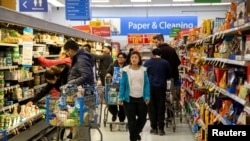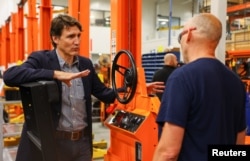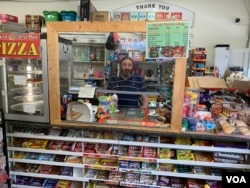Opposition parties in Canada are seizing on the highest inflation rate since 1983 to batter the government of Prime Minister Justin Trudeau, less than a year after it was returned to office for a third term.
"I was shocked how many people came up and said to me that was their first meal of the day. That is unbelievable," said Conservative Party member of Parliament Rick Perkins who hosted a free BBQ at his constituency office in Nova Scotia to mark the July 1 Canada Day holiday.
"The cost-of-living increases are very tough. Every day people are phoning our office crying that they can't afford food, they can't afford their medicine," he told VOA.
While acknowledging that global factors, including the COVID pandemic and the war in Ukraine, are behind much of the inflation, Perkins and other opposition politicians say the government is not doing enough to soften the blow.
"In Nova Scotia, as the average Nova Scotian faces hardships, federal Liberal MPs have been silent, as their constituents suffer," he said.
Canada's annual inflation rate rose to 7.7% in May, in line with what is happening in other developed countries around the world, according to TradingEconomics.com. "The main upward pressure came from transportation, food, and shelter as Western sanctions in response to Russian attacks on Ukraine continued to lift the prices of energy and commodities," it said.
The politically sensitive price of gasoline, at $1.70 per liter ($6.43 per gallon) is in fact in the middle of what is paid in other G-7 countries — substantially below the price in Britain ($2.32 per liter) or France ($2.11), but much higher than in the United States ($1.33) or Japan ($1.25).
But that is small comfort to people like Elias Habib, the co-owner of Jubilee Junction, a convenience store and pizzeria in Halifax, Canada, who said his business has not suffered so far, but he pointed up that "Everyone's complaining. It's too high, too fast."
When asked about the prices of gas, Habib told VOA, "I have to get back and forth to work. It's not fair, but we understand what's going on. Hopefully it's just a small thing then it'll go back to normal."
Jo-Ann Roberts, former interim leader of the Green Party of Canada, also emphasized the rising costs of gas and food "are of greatest concern to the average Canadian." And like Perkins, she said she is looking for the government to act more aggressively to help.
"It is important to consider who suffers during inflationary times and who benefits," she said. "The goal of a democratically elected government is to help those who are suffering and ensure that any corporate benefits of inflation are reasonable and equitable. …
"Rather than look for ways to just increase supply, government should be helping reduce demand. This means putting more funds into energy conservation programs such as subsidizing electric vehicles and home retrofits."
Ernest Lang is the founder of the Promerita Group and chairman of Zest Communities. He also was a founding partner of one the leading portfolio and wealth management practices at RBC Dominion Securities, Canada's largest wealth management and investment company.
He told VOA the current rate of inflation "pushes the middle class closer to insolvency, because baseline solvency is already marginal."
Lang added that high net worth Canadians who own hard assets such as property will be better able to deal with the inflation because their assets will retain their value.
"The reality is that most of the current inflationary factors are exogeneous to Canada," he said. "We are now seeing primarily cost-push inflation from supply disruption and curtailment, initially from lockdowns, and exacerbated by the Russian invasion of Ukraine."
He said, though, it is the responsibility of good leaders to implement thoughtful and effective monetary, economic and fiscal policies to help support the well-being of the people they lead.
University of Toronto economist Angelo Melino noted that the same labor shortage seen in other countries is driving up wages in Canada, although not quickly enough to keep pace with inflation.
"Finance and professional services, incomes are rising relatively quickly, and also in the service industry and restaurant industry," he said. "Food workers' wages are rising quickly compared to other industries."
But, he said, there is not much that most Canadians can do to ameliorate rising prices. "If you can, use less of it. You'll be better off. Maybe more people will be taking public transit."
And if that is too depressing, there is one consolation for residents of Canada, where alcohol has long been legal and recreational use of marijuana was legalized in 2018.
"Since January, alcohol and recreational cannabis is one category that wasn't going up very quickly," he said.






